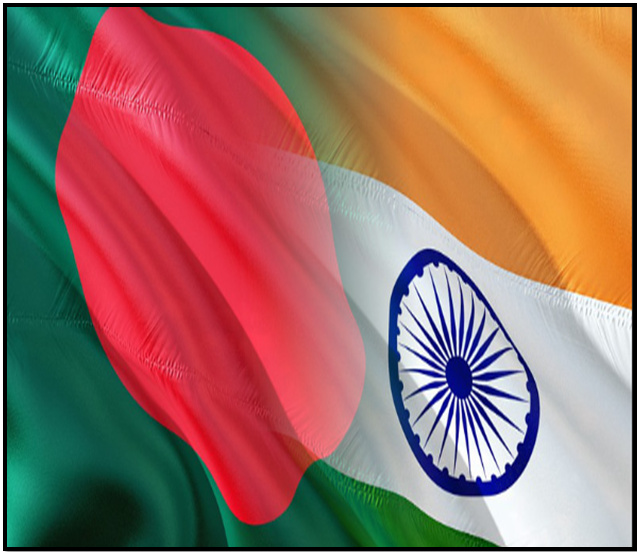GEOPOLITICAL BALANCE FACES NEW CHALLENGES
Syllabus:
- GS 2: Bilateral Relations
Why in the News?
The recent resignation of Bangladesh’s leader Sheikh Hasina, amidst escalating unrest and violence, has created instability in South Asia, posing new geopolitical challenges for India.
Source: Hindustan Times
Introduction
- India’s strategic interests in South Asia face new challenges with the recent upheaval in Bangladesh, marked by Sheikh Hasina’s resignation and rising instability.
- This development adds to India’s existing geopolitical concerns, demanding a reevaluation of its foreign policy and regional strategy amidst growing influences from China and Pakistan.
| India-Bangladesh Relations
Bilateral Ties and Recent Activities
Security and Border Management
Defence Cooperation
|
Geopolitical Instability in South Asia
Political Turmoil in Bangladesh
- Sheikh Hasina’s resignation and flight to India have created a significant governance vacuum in Bangladesh.
- The month-long unrest and street violence in Bangladesh have destabilized the region.
Security Concerns for India
- The governance vacuum in Bangladesh has raised security concerns for India.
- There is an increasing fear of encirclement, adding to India’s geopolitical challenges.
- Economic Repercussions: The instability in Bangladesh is expected to impact India’s domestic economy.
India’s Geopolitical Challenges
Global Geopolitical Turmoil
- India’s geopolitical landscape has been increasingly strained since Russia’s invasion of Ukraine.
- The ongoing Israel-Palestine conflict has further complicated India’s position on the global stage.
Economic Impact
- Both conflicts have disrupted global trade and supply chains, leading to elevated commodity prices and imported inflation in India.
- India’s economy has been adversely affected by these disruptions.
Strategic Neutrality
- India has adopted a neutral stance, criticizing war without condemning Russia, due to its reliance on Russian military hardware and discounted crude oil.
- New Delhi’s strategic partnership with Israel, especially in aviation technology and intelligence, has influenced its silence on Israel’s actions in Gaza.
Challenges in the Neighbourhood
- The resignation of Bangladesh’s leader Sheikh Hasina has heightened security concerns in India’s immediate neighbourhood.
- India’s foreign policy may need to shift from its balanced approach to address the growing instability in South Asia.
Bangladesh’s Diplomatic Maneuvering
Sheikh Hasina’s China Visit
- On 13 July, Sheikh Hasina cut short her Beijing trip, disappointed with China’s $100 million aid, far less than the $5 billion expected.
- Reports suggest Hasina felt slighted by China’s treatment during the visit.
Bidding War for Mongla Port
- Before her China visit, Hasina had visited New Delhi twice.
- She initiated a bidding war between India and China for the modernization and operational rights of Bangladesh’s Mongla port.
- Upon her return to Dhaka, reports indicated that India secured the operational rights for Mongla port, following the 2018 decision allowing India access to Chittagong and Mongla ports for transporting goods to the Northeast.
Balancing India and China
- Sheikh Hasina’s delicate balancing between India and China has reached a crucial juncture.
- The Mongla port deal has escalated tensions, turning simmering issues into a critical situation.
Expert Opinion
- Professor Asif Nazrul of Dhaka University predicted that the India-Bangladesh and China-Bangladesh relations would eventually clash, and the port deal appears to be that flashpoint.
Political Turmoil in Bangladesh
Student Protests and Escalating Violence
- On 1 July, student protests in Bangladesh began peacefully, demanding job quota reforms.
- After Sheikh Hasina’s return from Beijing on 14 July, the protests turned violent, spreading across the country.
- On 16 July, police firing killed six students, intensifying the unrest.
Military Curfew and Hasina’s Resignation
- The Mongla port deal between India and Bangladesh was likely finalized around 18 July.
- By 20 July, the violence claimed over 260 lives, leading to a military curfew.
- On 5 August, Sheikh Hasina was forced to resign and flee as the military struggled to control the violence, which was speculated to be influenced by Jamaat-e-Islami and linked to Pakistan’s ISI, with possible backing from Beijing.
Challenges for India
- With Hasina’s resignation, India lost a key ally in the region.
- The new regime in Bangladesh may re-examine past agreements, including the Mongla port deal, potentially disrupting India’s access to the Northeast through Mongla and Chittagong ports.
- There is a significant risk that the new regime might align with other powers, granting them access to strategic locations in the Bay of Bengal, further complicating India’s geopolitical strategy.
Geopolitical Shifts in South Asia: India’s Emerging Challenges
Pakistan’s Political Realignment
- Pakistan, struggling with near bankruptcy and domestic instability, has established a new government with Imran Khan imprisoned.
- The Pakistani army and ISI have regained control over the political system, leveraging the situation to secure Chinese support.
- Prime Minister Shehbaz Sharif sought financial assistance from Beijing, offering security guarantees to China in exchange for debt restructuring and fresh funds.
Sri Lanka and Maldives: Shifting Alliances
- Sri Lanka’s 2022 economic crisis made it partially vulnerable, although China’s influence has temporarily waned due to debt-related issues.
- In the Maldives, the 2023 election of President Mohammed Muizzu has resulted in a perceptible distancing from New Delhi, raising concerns about a potential tilt towards Beijing.
Nepal and Bhutan: New Alignments
- Nepal’s political landscape has stabilized with P. Sharma Oli becoming prime minister for the fourth time, a leader known for his pro-Beijing stance.
- Bhutan, traditionally closer to India, is now seeking to improve ties with China to resolve border disputes and reduce security threats.
Implications for India
- India now faces a complex geopolitical landscape in South Asia, requiring a reassessment of its foreign policy strategies.
- The shifting dynamics across the region, with countries like Pakistan, Nepal, and Maldives moving closer to China, pose significant challenges for New Delhi.
Conclusion
India must adopt agile and adaptable diplomatic strategies, balancing regional relationships and countering China’s influence, as it navigates the evolving challenges in South Asia. Strategic adjustments are crucial.
Source:Livemint
Mains Practice Question:
Analyze how geopolitical developments in Bangladesh and neighbouring countries could affect India’s economic and security policies.
Associated Article:
https://universalinstitutions.com/india-bangladesh-relation/




